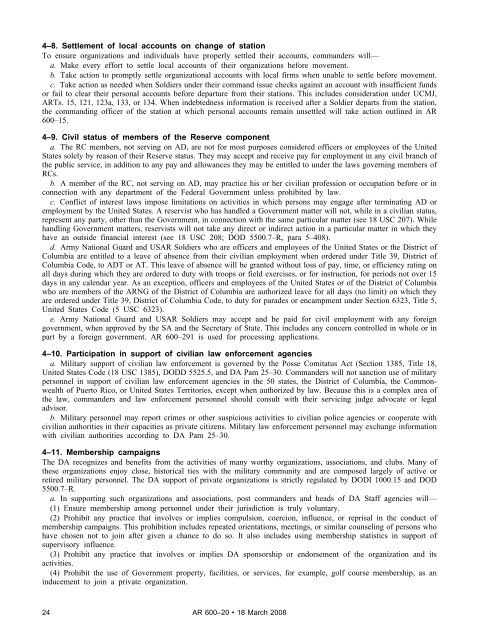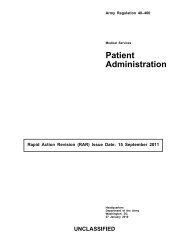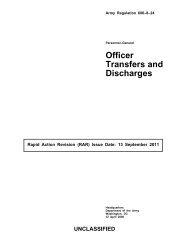AR 600-20, Army Command Policy - Army Publishing Directorate ...
AR 600-20, Army Command Policy - Army Publishing Directorate ...
AR 600-20, Army Command Policy - Army Publishing Directorate ...
Create successful ePaper yourself
Turn your PDF publications into a flip-book with our unique Google optimized e-Paper software.
4–8. Settlement of local accounts on change of station<br />
To ensure organizations and individuals have properly settled their accounts, commanders will—<br />
a. Make every effort to settle local accounts of their organizations before movement.<br />
b. Take action to promptly settle organizational accounts with local firms when unable to settle before movement.<br />
c. Take action as needed when Soldiers under their command issue checks against an account with insufficient funds<br />
or fail to clear their personal accounts before departure from their stations. This includes consideration under UCMJ,<br />
<strong>AR</strong>Ts. 15, 121, 123a, 133, or 134. When indebtedness information is received after a Soldier departs from the station,<br />
the commanding officer of the station at which personal accounts remain unsettled will take action outlined in <strong>AR</strong><br />
<strong>600</strong>–15.<br />
4–9. Civil status of members of the Reserve component<br />
a. The RC members, not serving on AD, are not for most purposes considered officers or employees of the United<br />
States solely by reason of their Reserve status. They may accept and receive pay for employment in any civil branch of<br />
the public service, in addition to any pay and allowances they may be entitled to under the laws governing members of<br />
RCs.<br />
b. A member of the RC, not serving on AD, may practice his or her civilian profession or occupation before or in<br />
connection with any department of the Federal Government unless prohibited by law.<br />
c. Conflict of interest laws impose limitations on activities in which persons may engage after terminating AD or<br />
employment by the United States. A reservist who has handled a Government matter will not, while in a civilian status,<br />
represent any party, other than the Government, in connection with the same particular matter (see 18 USC <strong>20</strong>7). While<br />
handling Government matters, reservists will not take any direct or indirect action in a particular matter in which they<br />
have an outside financial interest (see 18 USC <strong>20</strong>8; DOD 5500.7–R, para 5–408).<br />
d. <strong>Army</strong> National Guard and US<strong>AR</strong> Soldiers who are officers and employees of the United States or the District of<br />
Columbia are entitled to a leave of absence from their civilian employment when ordered under Title 39, District of<br />
Columbia Code, to ADT or AT. This leave of absence will be granted without loss of pay, time, or efficiency rating on<br />
all days during which they are ordered to duty with troops or field exercises, or for instruction, for periods not over 15<br />
days in any calendar year. As an exception, officers and employees of the United States or of the District of Columbia<br />
who are members of the <strong>AR</strong>NG of the District of Columbia are authorized leave for all days (no limit) on which they<br />
are ordered under Title 39, District of Columbia Code, to duty for parades or encampment under Section 6323, Title 5,<br />
United States Code (5 USC 6323).<br />
e. <strong>Army</strong> National Guard and US<strong>AR</strong> Soldiers may accept and be paid for civil employment with any foreign<br />
government, when approved by the SA and the Secretary of State. This includes any concern controlled in whole or in<br />
part by a foreign government. <strong>AR</strong> <strong>600</strong>–291 is used for processing applications.<br />
4–10. Participation in support of civilian law enforcement agencies<br />
a. Military support of civilian law enforcement is governed by the Posse Comitatus Act (Section 1385, Title 18,<br />
United States Code (18 USC 1385), DODD 5525.5, and DA Pam 25–30. <strong>Command</strong>ers will not sanction use of military<br />
personnel in support of civilian law enforcement agencies in the 50 states, the District of Columbia, the Commonwealth<br />
of Puerto Rico, or United States Territories, except when authorized by law. Because this is a complex area of<br />
the law, commanders and law enforcement personnel should consult with their servicing judge advocate or legal<br />
advisor.<br />
b. Military personnel may report crimes or other suspicious activities to civilian police agencies or cooperate with<br />
civilian authorities in their capacities as private citizens. Military law enforcement personnel may exchange information<br />
with civilian authorities according to DA Pam 25–30.<br />
4–11. Membership campaigns<br />
The DA recognizes and benefits from the activities of many worthy organizations, associations, and clubs. Many of<br />
these organizations enjoy close, historical ties with the military community and are composed largely of active or<br />
retired military personnel. The DA support of private organizations is strictly regulated by DODI 1000.15 and DOD<br />
5500.7–R.<br />
a. In supporting such organizations and associations, post commanders and heads of DA Staff agencies will—<br />
(1) Ensure membership among personnel under their jurisdiction is truly voluntary.<br />
(2) Prohibit any practice that involves or implies compulsion, coercion, influence, or reprisal in the conduct of<br />
membership campaigns. This prohibition includes repeated orientations, meetings, or similar counseling of persons who<br />
have chosen not to join after given a chance to do so. It also includes using membership statistics in support of<br />
supervisory influence.<br />
(3) Prohibit any practice that involves or implies DA sponsorship or endorsement of the organization and its<br />
activities.<br />
(4) Prohibit the use of Government property, facilities, or services, for example, golf course membership, as an<br />
inducement to join a private organization.<br />
24 <strong>AR</strong> <strong>600</strong>–<strong>20</strong> 18 March <strong>20</strong>08
















